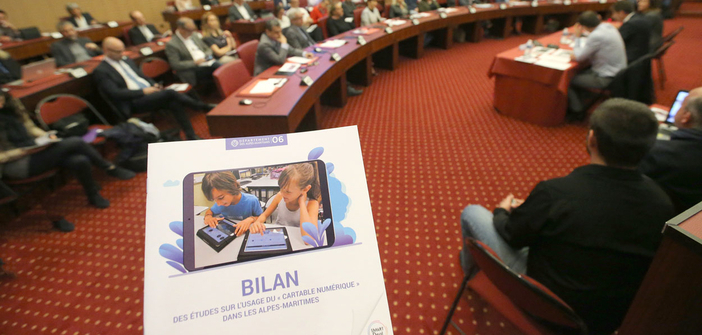This Tuesday, within the Departmental Hotel, the results of studies conducted in several schools in the Alpes-Maritimes on the use of tablets by students and teachers were revealed. The session was conducted in the presence of the President of the Department of Alpes-Maritimes, Charles Ange Ginésy, and the Director of the Laboratory for Innovation and Digital Education, Margarida Romero.
A summary report was distributed, the result of a study carried out in 2018 in 8 schools in the department, in partnership with the Académie de Nice and the services of the Academic Delegation for Digital Education. 5 public institutions and 3 private ones benefited from tablets for 3,740 students who could use them in class and at home based on the teachers’ voluntary participation. The objective was to address several issues, notably concerning digital accessibility, reducing the weight of backpacks, and developing new pedagogical uses.
In order to make this study more credible, the analysis of the students’ perspective was not the only viewpoint considered. Teachers and parents also participated in a survey organized by the consultancy firm Klee Group. The Line Laboratory conducted the data collection directly with the students. A group of 35 experts participated in this project, and after analyzing all the observations, many important points were raised.
Here are the seven lessons learned from this work:
1 – The primary objective of reducing the weight of backpacks has been achieved.
2 – The tablet sometimes has a moderate but diversified use in schools. It should transition more from a consultative use to one involving co-creation of content and knowledge with the student’s participation.
3 – The tablet is disinhibiting; it makes the student more active in their learning, allowing them to deepen their knowledge.
4 – It develops new transversal skills: critical thinking and computing, problem-solving, creativity, autonomy, and responsibility.
5 – The tablet is a mediating object that transforms personal use into collaborative and creative mode.
6 – The integration of the tablet is not intended to replace usual teaching and learning processes; it only enriches them.
7 – The tablet forces the teacher to reconsider their position and take on a new role as a team captain integrated into the class.
Some limitations and difficulties emerged from this study, for example concerning the fear of screen addiction, the loss or theft of the tablet, and the inequality of access to home networks. In order to overcome these findings, recommendations have been made to better understand and expand the use of this digital tool. This includes adapting classroom arrangements, implementing training days for teachers, and deploying this equipment more effectively across the territory.


